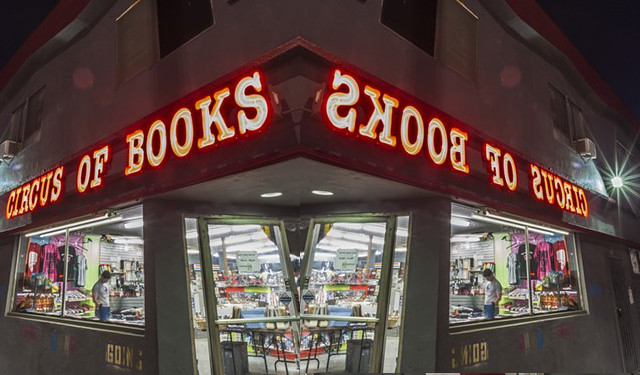Circus of Books is a Loving Tribute to a LA Institution
Written by Ian Thomas Malone, Posted in MovieReviews
The mountains of progress that have been made in the fight for LGBTQ equality in recent years can make it easy to forget just how hard it was for gay people to connect just a few years ago. Before the age of Grindr and Tinder, places like Circus of Books served as meeting places for gay people to meet each other in relative safety. The Internet drastically reshaped the American economy, particularly the porn industry, leaving plenty of mom and pop establishments struggling to make ends meet.
The documentary Circus of Books follows the final days of the beloved establishment, as well as the couple who ran it. Karen and Barry Mason hardly look like the kind of people who would become major distributors of hardcore gay porn, but the two created a successful business out of an industry that was almost completely decimated by the Reagan administration. Directed by their daughter Rachel, the film presents an intimate look at how Circus of Books operated in its heyday.
Mason does a deep dive into her parents’ life work, from the early days acquiring the store, to their role as producers of gay porn starring icons like Jeff Stryker, all the way to the last days of the business. Interviews from former staff as well as Hustler founder Larry Flynt help give context into the world of gay porn distribution and the Mason’s important role in the supply chain.
As a documentary, Circus of Books mostly splits its attention between the bookstore and the Mason’s complicated home life, particularly toward Karen’s handling of the coming out of their son, Josh. Rachel thoroughly explores the seemingly contradictory mindset of her mother’s reluctance to accept her own son’s homosexuality while running an establishment that caters to the gay community. The whole sequence is a little uncomfortable to watch, like seeing a family air out its dirty laundry, but the resolution serves as a good reminder that allies are as complex and diverse as the broader LGBTQ community itself.
There is a point where Karen expresses to her daughter that maybe the documentary should have been about some of the actual gay pioneers during a visit to USC’s archives, a sentiment that’s perhaps included in the film with an inflated sense of confidence. Rachel Mason crafts an interesting and well-paced narrative, albeit one that often struggles to shake the aura of a vanity project. The sense that the Mason family is only participating because their daughter is the director remains particularly present in the third act.
Circus of Books was an important LGBTQ cultural spot in Los Angeles. Mason lovingly pays tribute to her parents’ business while giving her audience plenty of reasons to care about this piece of gay history. The modern age doesn’t have the same need for physical media, but stores like Circus of Books served a broader purpose in giving a marginalized community a place for connection. It will be missed not necessarily for its back room or “Vaseline alley,” but for the sense of belonging that its presence helped foster.











